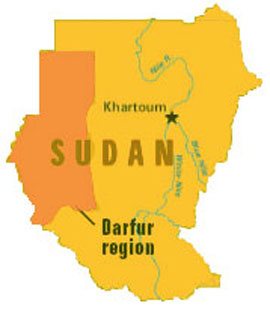
Why should I care what is happening in the Darfur region of Sudan in East Africa?
Martin Luther King, Jr. once said, "Injustice anywhere is a threat to justice everywhere." If we indeed value human life, human rights, civil rights, and justice, we as individuals have an obligation to denounce violations of these principles. Furthermore, the world community has a responsibility to prevent genocide.
What is happening in Darfur, Sudan? Why is it called a genocide?
Since 2003, there has been a war between the Sudanese government and two rebel groups in this western region of Sudan. The government forces and the ethnic militias called "Janjaweed" have systematically attacked the Darfurian civilians, killing unarmed people, burning their villages, stealing their livestock, and forcing them to flee. The government forces, the Janjaweed, and recently other armed groups have also terrorized these displaced people in and around their refugee camps. These armed groups are using rape as a weapon to further demoralize and destroy the social fabric of the Darfurian peoples. These brutal actions have been called "ethnic cleansing" and "genocide" (even by Colin Powell and President George W. Bush).
Why is the situation called a humanitarian crisis?
Now over a million persons (some estimate nearly two million) have been displaced from their homes and are living in refugee camps in Sudan and neighboring countries. These refugee camps are crowded; food, water, and medical resources provided by aid organizations are stretched to the limit. Furthermore, the people in the camps near Sudan's border with Chad are vulnerable to further attacks. The situation is urgent because thousands are dying every day, either from the direct violence, or from the stress of being displaced, sick, and hungry.
What is already being done to address this crisis?
Several international aid organizations are functioning in and near Darfur. However, they need resources and protection in order to continue serving the displaced peoples. There are also about 7,000 African Union troops in the Darfur region, with a mission to protect the civilians. However, the AU troops are underfunded and ill-equipped, and are largely ineffective. In September 2006, the United Nations authorized a UN peacekeeping force for Darfur, but the Sudanese government continues to reject the plan to put the UN forces on the ground.
What can I do to help change the situation in Darfur?
- Be informed. There are numerous websites now that report on the situation. You will find a list of some of them at the end of this document.
- Contact your elected officials and ask them to do something about the situation in Darfur. Many websites provide text for a letter you can use as the basis of your message to elected officials and world leaders.
- Contact your local media organizations and ask them to give more reports and more visible coverage to the issue.
- Get involved with an organization that is raising awareness about the situation. On September 17, rallies were held in New York City and other cities around the world to show support for the United Nations plan to put peacekeepers in Darfur. We plan to have a march at IUP on Tuesday, October 3, to show our support for the beleaguered peoples of Darfur.
- Donate money to aid organizations that are serving displaced peoples from Darfur.
- Be a leader and organize an event about Sudan at your school, workplace, or place of worship. The more people that learn about this situation, the more pressure will be put on local, national, and international leaders to take decisive action on this urgent matter.
Here are some useful websites to help you learn more about Darfur and take action.
See the blog and photo journal posted by the NBC Today Show's Anne Currie about her trip to Sudan. The blog also has links to organizations serving in Sudan and/or raising awareness about it.
CARE International, providing humanitarian aid in Sudan
Damanga Coalition for Freedom and Democracy, led by Mr. Mohamed Yahya, who spoke at IUP in March 2006